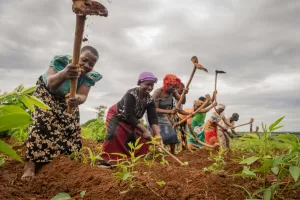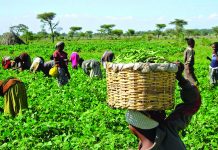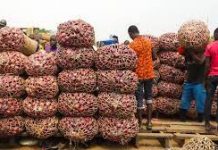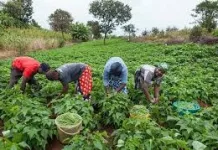Due to the constant hike in price of commodity and cost of living in Nigeria, female farmers have begged to be included in the federal government’s palliative sharing plan.

The economic situation in Nigeria has subjected many people to hardship which they never planned for, the more they struggle, the harder the situation gets.
A group of female farmers under the umbrella of Small Scale Women Farmers Organisation of Nigeria, have cried out lamenting how difficult it has become to survive in Nigeria.
Have You Read: 3 Ways To Benefit From ‘Tinubu Farmers Funds’
The Cost Of Survival In Nigeria Is Killing Us
Before the fuel subsidy was removed, farmers pay between ₦800 to ₦1200 from their farms to the market. Now we pay ₦2000 to ₦2500.
“They said the cost of living in Nigeria is killing us, and have urged the federal government to include them in the palliatives measures being distributed across the country.”
Fertilizer that was sold for ₦17,000 and ₦30,000 at the market now sells for ₦28,000 and ₦35,000 respectively.
The President of the female farmers group, Mary Afan, was grieved, noting that the high cost of living had forced smallholder farmers to reduce the size of their farmlands.
She said on Tuesday in Abuja that it was no longer news that the prices of transportation, food, goods and services had increased astronomically in the last few months.
We Want FG’s Intervention
The group requested for immediate palliative measures from the federal government on the following:
- Improved seeds and farm input for dry season farming
- Targeted transportation subsidies to smallholders
- Support for climate-smart agriculture
- Market access enhancement and
- Improved agricultural funding amongst other things
Afan said, “While we acknowledge the move of the federal and state governments to provide palliatives for citizens as succour for these very challenging times.
“We are deeply concerned that there is no strategy or framework in place to capture farmers, especially women farmers in the distribution of palliatives.
“Most worrisome is that there seem to be no palliative measures such as inputs, improved seedlings and seeds to encourage farmers to increase production.
Agriculture Is At The Receiving End Of Government’s Policy
“Sadly, the removal of fuel subsidy and other government policies have brought forth significant challenges for our nation’s agriculture and drive for food security.
The rise in the cost of farm inputs and transportation is having profound implications on smallholder women farmers in the agricultural industry.”
Furthermore, Afan, noted that fuel subsidy removal is affecting the livelihoods of smallholder farmers who rely on affordable means of transportation to move their produce from the farms to the market.
Afan added that, “Farmers have not been able to access fertilizers, seedlings, and agrochemicals which are usually sold in urban and semi-urban areas.
The movement to markets has been difficult. Processing of farm produce especially those that require petrol-powered engines has also been paralyzed by this policy direction.
“Sadly, this new reality has compounded the woes of smallholder women farmers in Nigeria who are still grappling with the high cost of fertilizers and other agricultural inputs whose prices has since become exorbitant following the Russia and Ukraine war.
Consequently, the new policy move of the federal government has also severely affected the prices of farm inputs, causing them to become far out of reach.
“Since the announcement by Mr. President, the average cost of farm inputs has risen by 71%.
You May Also Like: Food Security: Farmers Make Demand From Tinubu
Farm labor cost has also risen by 149% not forgetting transportation cost that has risen by over 130%.”
The group’s Vice President, Grace Disa said the farmers challenge requires urgent attention of the federal and state governments.
Disa noted that if the issues were left unaddressed, the increased burden on us the farmers could lead to food insecurity, severe nutritional deficiencies, high poverty levels, and a further decline in farmers’






